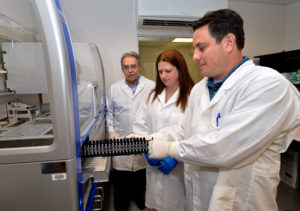The Marshall University Forensic Science Center was awarded a $154,577 grant from the National Institute of Justice to conduct a research project on methods involved with screening and processing sexual assault kits.

Jason Chute, M.S., technical leader of Marshall’s forensic DNA laboratories, is the project’s principal investigator. Co-principal investigators are Dr. Terry W. Fenger, director, and Season Seferyn, M.S., a DNA analyst.
Backlogs of untested sexual assault kits have drawn national attention in recent years. According to the Rape, Abuse and Incest National Network (RAINN), there are about 293,000 victims of rape or sexual assault per year who are the age of 12 or older..
In the past the federal government has estimated there are hundreds of thousands of untested sexual assault kits nationally, which is known as the rape kit backlog, according to ENDTHEBACKLOG, a program of the Joyful Heart Foundation.
Chute said Marshall’s Forensic Science Center has tested about 2,500 sexual assault kits from West Virginia and large metropolitan areas including New Orleans, Los Angeles and Detroit. The projects were supported by the National Institute of Justice, which facilitated the partnerships as part of a national effort to address untested sexual assault kits.
“We recognized a need for this research project, which will benefit state and local laboratories across the nation by giving an option that could increase efficiency, and decrease the turnaround-time of testing evidence from sexual assault kits,” said Chute.
The project is titled “Evaluating the Efficiency of the Use of the Qiagen® QIAsymphony® with High Throughput Y-screening as an Alternative to Conventional Serology.” The grant began Jan. 1 and runs through March 31, 2017.
The project will compare testing results using conventional serology screening, a labor-intensive method, to an automated screening method for the presence of male DNA and includes a cost analysis to compare and evaluate the two processes.
Historically, serology screening has been the laboratory method used for processing sexual assault kits, Chute said. Marshall’s forensic casework lab currently uses the conventional serology method to screen sexual assault kits.
He said serology is the process that forensic science laboratories use to identify body fluids that may contain DNA on evidentiary items of individuals involved in criminal acts. Screening is a laboratory method used to determine which evidence will move forward to DNA analysis. Y-screening is a method used to identify male DNA.
“If body fluids are identified on samples, those samples are moved forward to the DNA analysis process, which helps to identify the individuals,” Chute said.